|
|
|
Sort Order |
|
|
|
Items / Page
|
|
|
|
|
|
|
| Srl | Item |
| 1 |
ID:
127015
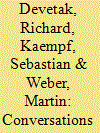

|
|
|
|
|
| Publication |
2013.
|
| Summary/Abstract |
This in-depth conversation with Professor Andrew Linklater engages with his academic biography, his intellectual contribution to the field of International Relations (IR) and his reflections on the current state of, and challenges facing, the discipline of (IR). It thereby traces his biography from his undergraduate days in Aberdeen, via his first lectureships in Australia, back to the United Kingdom and eventually to Aberystwyth University; it engages with his main oeuvres from the 1982 book Men and Citizens in the Theory of International Relations to his most recent work on The Problem of Harm in World Politics, and covers the development of IR as a global discipline from the 1970s until today.
|
|
|
|
|
|
|
|
|
|
|
|
|
|
|
|
| 2 |
ID:
090360
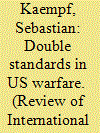

|
|
|
|
|
| Publication |
2009.
|
| Summary/Abstract |
This article investigates how - by breaking with the historical double standards regarding civilian protection in conflicts - by the end of the twentieth century, US warfare has come to comply with International Humanitarian Law (IHL). Yet, civilians are still being killed. This has sparked controversies over what constitutes legitimate targeting practices and as to whether higher levels of civilian protection could be achieved. Through an engagement with these debates, including an exploration of the evolution of the norm of non-combatant immunity with specific reference to US warfare, the article argues that IHL does not provide fully satisfactory answers to these issues as it is too permissive in relation to the killing of civilians. The article proposes that more stringent moral guidelines, such as those underpinning the idea of 'due care', have the potential to go much further in providing protection for the innocent in war.
|
|
|
|
|
|
|
|
|
|
|
|
|
|
|
|
| 3 |
ID:
107897
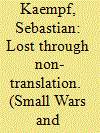

|
|
|
|
|
| Publication |
2011.
|
| Summary/Abstract |
While Carl von Clausewitz has generally been respected as one of the most profound philosophers of war, his expertise has been regarded as somewhat limited if not even irrelevant to the so-called 'new wars' of the post-Cold War world. Many scholars in international relations have claimed that 'new wars' are essentially 'post-Clausewitzian' and 'post-trinitarian' in nature, meaning that they are no longer fathomable through a Clausewitzian framework. However Clausewitz's earlier writings were nearly exclusively dedicated to guerrilla warfare, or what he called 'small wars'. These writings have been largely overlooked by many analysts of contemporary conflicts. By drawing on his rare and untranslated writings, the article uncovers a critical part of Clausewitz's expertise in asymmetric warfare and shows that, far from being irrelevant in an age where interstate warfare is increasingly being replaced by conflicts between states and semi-/non-state actors, Clausewitz's philosophical writings actually shed new light into the particular interactive dynamics generated during wars waged under conditions of asymmetry.
|
|
|
|
|
|
|
|
|
|
|
|
|
|
|
|
| 4 |
ID:
123783
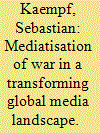

|
|
|
|
|
| Publication |
2013.
|
| Summary/Abstract |
Before the rise of digital new media technology in 2002, 'old' media at its heart displayed a fundamental division between sender and receiver, a division which for a long time had structurally, materially and politically conditioned the nature of the relationship between 'old' media and war. Within the recently emerging digital new media technology, however, this age-old separation between sender and receiver has been eroded. Thus, alongside traditional media platforms, an entirely new form of media technology has arisen. This development has transformed the hitherto multipolar nature of the old media landscape and has led to a heteropolar global media landscape, in which the relationship between media and war has been altered. By exploring how digital new media poles are forming and old media poles are evolving, this article examines how this seismic shift in the global media landscape requires a redefinition of the understanding of the nature of the relationship between media and conflict today.
|
|
|
|
|
|
|
|
|
|
|
|
|
|
|
|
| 5 |
ID:
133549
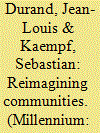

|
|
|
|
|
| Publication |
2014.
|
| Summary/Abstract |
There comes a time when transmitting the history of a national past fails the context of the political present. France and Germany have shared tortuous historical experiences, yet the two are at the forefront of an unprecedented pedagogical development: for the first time ever, two nation-states have created a common history textbook that is used in their senior secondary schools. As such, each country, to borrow Ernst Gellner's formula, has abandoned - qua this textbook - its monopoly of legitimate education. Histoire/Geschichte detaches history from its exclusive national past and introduces the learners to a post-national present. It speaks in a tone that is demanded by a different time and by the new conditions of peoples who are living in a common political space. This article reflects on the meaning and reach of this precedent by first analysing the explicit political and pedagogical explanations inherent to the book. It then identifies and investigates some of the less evident effects of the textbook relating to rethinking war and history, rethinking the monopoly of education, rethinking national identity, and to offering another path to rapprochement.
|
|
|
|
|
|
|
|
|
|
|
|
|
|
|
|
| 6 |
ID:
099800
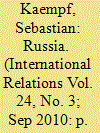

|
|
|
|
|
| Publication |
2010.
|
| Summary/Abstract |
Outlining the century-old debates about 'What is Russia?', this article - by drawing on a variety of sources such as fiction, culture, cartoons and identity - shows how Russian and Western answers to this question have impacted on each other. To do so, the article first examines the extent to which Russian society - ever since the Mongolian Yoke - has been culturally torn between Westerniser and anti-Westerniser positions. It then complements the insights into Russia's self-reflective identity formation in two ways: by illustrating how Russia, in the West, has become portrayed as a caricature of the Western consciousness and by demonstrating how the Russian 'Self', in return, has been defined through the prism of Western expectations.
|
|
|
|
|
|
|
|
|
|
|
|
|
|
|
|
| 7 |
ID:
167542
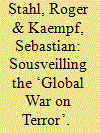

|
|
|
|
|
| Summary/Abstract |
This article theorises what it means to challenge official regimes of surveillance in the War on Terror by further developing the notion of ‘sousveillance’. In particular, we focus on the performative dimension of surveillance by attending to its sites of struggle, particularly where alternative and counter-performances work to disrupt and dislodge official regimes of vision. These potent counter-performances have become important flashpoints for discussion in the ongoing negotiation of security state power since the onset of the War on Terror. The article begins by considering what it means to call surveillance ‘performative’ and how such official performances have had a documented chilling effect on free expression and democratic deliberation. It continues by exploring Steve Mann’s notion of ‘sousveillance’, or the view from below, as a theoretical resource for understanding counter-visual performances that otherwise challenge authoritarian surveillant practices. Finally, the article illustrates these dynamics through a number of sousveillant performances that have provoked new deliberative spaces in the context of the War on Terror.
|
|
|
|
|
|
|
|
|
|
|
|
|
|
|
|
| 8 |
ID:
113208
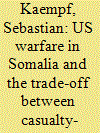

|
|
|
|
|
| Publication |
2012.
|
| Summary/Abstract |
This article examines the ways in which the two normative concerns of casualty-aversion and civilian protection influenced US military strategy in the particular context of the asymmetric conflict in Somalia in the early 1990s. The article critically evaluates US military operations through the prism of international humanitarian law and examines whether American forces started prioritizing casualty-aversion over the safeguarding of Somali civilians. Finally, by drawing on emerging moral guidelines (such as Michael Walzer's idea of 'due care'), the article examines whether lower numbers of Somali civilian deaths could have been achieved if marginal increases to the risks faced by US soldiers had been accepted.
|
|
|
|
|
|
|
|
|
|
|
|
|
|
|
|
| 9 |
ID:
085929
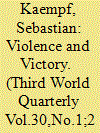

|
|
|
|
|
| Publication |
2009.
|
| Summary/Abstract |
This contribution critically investigates the ideas underpinning the armed struggle of colonial subjects against colonial states in the middle decades of the 20th century. It focuses in particular on two of the most influential texts that inspired and guided violent anti-colonial resistance, The Wretched of the Earth by Frantz Fanon and On Guerrilla Warfare by Mao Zedong. Both Fanon and Mao provided powerful analyses of the violent (psychological and military) underpinnings of colonialism and articulated strategies of resistance. This contribution argues that the persuasiveness of Mao's and Fanon's thought stemmed from their deep dialectical (ie Hegelian) understanding of war and colonialism. By demonstrating the dialectical foundations of Mao's and Fanon's thought-inspired intellectually by their readings of Carl von Clausewitz and Jean-Paul Sartre-the contribution illustrates how their understanding allowed them not only to fathom the interactive dynamics at the core of war and colonialism, but also to devise successful ways of unseating colonial power. Yet, while they shared a common belief in violent anti-colonial struggles, they nevertheless diverged fundamentally in their respective conceptions of violence. Mao (through Clausewitz) held an instrumental view of violence, whereas Fanon (through Sartre) understood violence in existential terms. This meant, as is argued here, that their respective conceptions of violence would not necessarily, on their own, have been sufficient to bring colonialism to an end. Taken together, however, their instrumental and intrinsic conceptions of violence complemented each other and helped armed anti-colonial struggles succeed around the globe.
|
|
|
|
|
|
|
|
|
|
|
|
|
|
|
|
| 10 |
ID:
191956
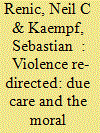

|
|
|
|
|
| Summary/Abstract |
In this article, we argue in favour of a conceptual expansion of the Just War idea of ‘due care’, to include the foreseeable, but indirect harm generated by Western force protection. This harm includes the phenomenon of ‘casualty displacement warfare’ – circumstances in which the prioritisation and relative success of Western force protection incentivises some Western adversaries to redirect more of their own violence away from Western soldiers and onto civilians. Primary moral responsibility for such violence should be allocated to those who violate the principle of non-combatant immunity, whatever their motivations. Critically though, we argue that Western militaries do bear some indirect culpability for the conflict conditions that structure such violence. These same militaries, we argue, are morally duty bound to do what they feasibly can to reduce the risks of casualty displacement, even if this necessitates a relaxation of their own commitment to force protection.
|
|
|
|
|
|
|
|
|
|
|
|
|
|
|
|
|
|
|
|
|